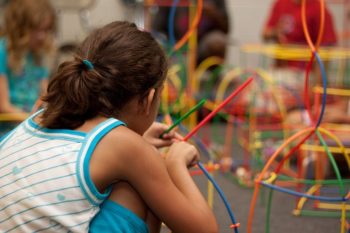Getting Ready For Next School Year
 Getting Ready for the Next School Year
Getting Ready for the Next School Year
Once you decide on a school for the upcoming school year, it is important to plan ahead throughout the spring and summer. For example, during the last weeks of summer, it is important to help your children plan for the first days of school by coaching them to become organized for the first day of school. Many children have later bedtimes during the summer. It is helpful to slowly adjust their wake-up and bedtime hours to align with the school year schedule a couple of weeks before school starts. Your children may resist at first, but the family will feel successful that they are ready for the new school year.
Schedule Dates with Children to Prepare for School
You can also schedule quality time with your children to plan for the first days of school. These special times may include:
- Completing all required medical exams
- Scheduling the school bus or carpool for student transportation
- Getting help for childcare options if necessary
- Scheduling before school, afterschool, and school break childcare and enrichment activities
- Preparing for nutritional breakfasts and school lunches
- Discussing with each child their food preferences
- Encouraging older children to help younger siblings pack lunches the night before school
- Planning for daily reading with your children or having them read independently each night before bed
- Scheduling homework help and summer review as needed
- Helping children organize their clothes for school
- Having children practice how to select outfits at bedtime for the next day
- Taking children shopping for shoes with added support from family members
- Purchasing grade-level school supplies
Middle and High School Considerations
Additional middle or high school student support can include:
- Purchasing sports and physical education uniforms and equipment
- Having your children meet with academic counselors for course selections
- Ensuring that children complete summer reading and homework assignments
- Completing documentation for internships, summer jobs, and community service projects relevant for specific course prerequisites, and college and career planning
Family Organizing Activities
During the last summer days, your children will cherish the time you spend with them preparing for the coming school year. It might be a great time to initiate new family routines and rituals for buying school supplies, family shoe shopping, purchasing new clothes for school, cleaning out bedrooms, organizing the arts, crafts, and school supplies, and celebrating with some family fun. Many parents spend the final days of the summer playing at parks and visiting the beach. Parents can shop with their children for school and help them organize their bedrooms and school supplies. Whatever your new routine will be, take the time to talk with your children about their dreams, fears, and anxieties. If they are starting a new school, try to schedule some playdates with neighborhood friends so that they can spend time talking about the first days of school. You can also host a back-to-school family barbecue, moms’ night out, or dads’ sport activity.
Managing the Daily Schedule
After months of planning, playing, and getting ready for school, the new school year is beginning. You have purchased the mandatory school items, helped your children organize themselves for the first day of school, and completed all paperwork and scheduling for transportation, aftercare, and extra-curricular activities. The best plan is to talk through the first day of school at dinner or before bed so that your children know what to expect. Also encourage them to express their concerns and feelings. Sometimes, schools have parents visit with their children in the classroom on the first day of school. Other schools encourage parents to drop their children off at the front of the school or have them take the bus independently. If you are feeling anxious, share your concerns with another parent who has children already attending the school. That parent can answer your questions and their children can help for added support.
First Day of School
Summarized below are suggestions that may be helpful for the first day of school:
- Plan meals and clothing options for school.
- Talk with your children about what to expect at the school.
- Visit the school with your children before the first day.
- Meet the teachers when appropriate.
- Confirm that your children know the daily drop-off and return from school schedule.
- Encourage the children to play outside on the playground and socialize on the school grounds.
- Relax with your children when they return home and discuss their successes and challenges.
Additional middle or high school activities may include:
- Encourage children to use their course schedule to locate the assigned classroom for each course.
- Have children locate their lockers and confirm that the locking combinations work.
- Ensure that your teens attend mandatory orientations and school leadership, sports, and activity orientations.
- Confirm that the children have their physical fitness and sports team clothing and equipment ready for use.
May your first days of school be filled with many happy memories and adventures as you support your children’s new school year!

 Adjusting to the First Weeks of School
Adjusting to the First Weeks of School Disasters?
Disasters?